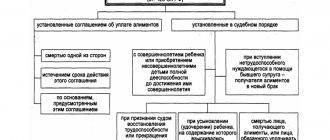Home / Alimony / Three ways to get advice on alimony without money
When and in what case does a person have the right to alimony and what should he do to collect it from the payer? These are the questions that are often encountered among people who turn to lawyers for help. But did you know that you can get expert advice for free?
In our article we will tell you about the ways in which you can contact a lawyer without paying for his services and how to check the quality of the assistance provided.
What powers do bailiffs have?
Documentation
To start a case, the bailiff needs documents, without which there is no authority to start proceedings. Such documents include:
- a statement from the payee, which contains information about the details of the recipient's accounts for receiving alimony;
- an executive document that legitimizes the bailiff’s right to seize the debtor’s property;
- banking organization details.
An error when drawing up an application or incorrect indication of bank account details relieves the bailiff of responsibility if the funds do not reach the addressee. To complete the application, the payee is recommended to seek assistance from a person who has the necessary level of qualifications to correctly complete and verify this application.
Sometimes, during disputes over alimony, you have to deal with a situation where the bailiffs are not working. In order to influence the process of a case, it is necessary to send complaints about the inaction of officials (when appealing to immediate superiors, there is usually no effect, but when contacting the prosecutor’s office, the work begins to intensify). The recipient is advised to file petitions to seize the debtor's property.
If the case was lost by the bailiff, it is necessary to obtain an appropriate explanation in writing. Such an explanation is the basis for applying to the court to demand the issuance of a duplicate of the writ of execution.
Sometimes bailiffs are negligent
The activities of the bailiff department are regulated by a number of legislative acts, including:
- Law “On Enforcement Proceedings” (Federal Law No. 229-FZ of October 2, 2007);
- Law “On Bailiffs” (Federal Law No. 118-FZ of July 21, 1997).
In accordance with regulations, bailiffs are vested with powers within the framework of executive actions, as well as enforcement measures. Thus, the bailiff involved in alimony proceedings has the right:
- call for an appointment with persons responsible for paying alimony;
- request personal data of the persons involved necessary for production;
- visit the debtor’s home without his consent (if there is a court decision);
- arrest and confiscate money, securities and other property for their further evaluation and storage;
- put the defaulter on the executive wanted list and restrict his travel abroad;
- impose restrictions on the debtor’s receipt of a number of government services (issuance of a foreign passport, driver’s license and other documents);
- transport the debtor to draw up a protocol and carry out detention in order to implement procedural actions.
To prove this, you may have to conduct an internal investigation.
Failure by a bailiff to fulfill official duties (in other words, inaction) is an immediate basis for filing a complaint with higher authorities. A party interested in the timely receipt of alimony from the debtor may declare negligence in the actions of an FSSP employee in cases where the bailiff:
- ignores court orders;
- within 60 days did not take measures to implement the collection (we are talking about such actions as establishing the place of employment and data on income, sending a writ of execution to the accounting department of the employing company, informing the debtor about the consequences of evading payment of alimony, going to the debtor’s place of residence to seizure of property, etc.);
- misses deadlines for implementing a court decision;
- violates the rights and interests of the party receiving funds for the child;
- denies the parties the right to familiarize themselves with production materials without the specified grounds;
- commits coercive actions towards the debtor without giving him the opportunity to repay the debt voluntarily.
Evidence of such inaction should be facts revealed during the official and prosecutorial investigation based on the direct appeal of the claimant.
In this case, higher-level organizations can come to the rescue
If the collector has grounds to assert that the lack of receipt of funds from the debtor is associated with the improper performance of his duties by the bailiff, he can complain to a number of higher authorities. In order to protect his material rights, the recipient of alimony may file complaints:
- management of the FSSP department;
- to the prosecutor's office;
- to court.
In these actions, the applicant may refer to the provisions of Articles 123, 128 of Federal Law No. 229, Article 19 of Federal Law No. 118.
A sample complaint submitted to one of the above bodies does not have a single approved template. Nevertheless, the structure of the document provides for certain drafting rules.
The complaint states:
- details of the body to which the appeal is sent (name of the FSSP department, prosecutor's office or court);
- applicant’s details (full name and residential address);
- details of the official against whom the complaint is being made;
- statement of facts - here you should indicate the data of the enforcement proceedings, as well as information indicating the inaction of the bailiff;
- description of the requirements: if a complaint is filed with the FSSP department or a judicial authority, the applicant must demand that the employee’s inaction be recognized as illegal and encourage him to correct the situation. If the appeal is sent to the prosecutor's office, the applicant must demand that the legislative violation be eliminated and prosecutorial response measures be taken.
The appeal also indicates a list of documents that are submitted along with the complaint.
Making such a complaint is not difficult
The first instance where you should file a statement about the negligence of the bailiff is the territorial department of the FSSP. The claimant can file a complaint with the senior bailiff on any of the grounds indicated above. In most cases, a reasoned appeal to the management of the authority is an effective tool for influencing a subordinate employee.
The claimant must submit such an application within 10 days from the moment he became aware of the facts of the bailiff’s inaction. The period for consideration of a complaint of this type is 10 days from the date of registration of the complaint. Based on the results of the review, the applicant is provided with a written response.
If your husband does not pay alimony and the bailiffs are inactive, you can complain to the prosecutor
If at the stage of consideration by the first instance authority the applicant’s request was not satisfied, regarding the bailiff’s inaction, he can initiate an investigation at a more serious stage - with the prosecutor’s office. After examining the case materials, the prosecutor must issue an order. Ignoring his requirements entails disciplinary and even criminal liability.
Applications submitted to the prosecutorial authorities at the place where the FSSP official performs his duties are considered within 30 days from the date of their registration.
We invite you to read: Alimony for the mother of a child under three years old according to the Family Code of the Russian Federation
If rights are violated, you can appeal the actions of the bailiff
The highest authority that considers appeals regarding the inaction of FSSP employees is the court. Applications are submitted to the office of the district court and are not subject to state fees. To effectively challenge the actions of the bailiff, it is important to present the facts in as much detail as possible, citing violations of regulations and the evidence base.
The application must be accompanied by copies and originals of the following documents:
- the applicant's general passport;
- resolution to initiate enforcement proceedings;
- last page of production materials;
- text, audio and video recordings of conversations with an official (if any).
Appeals to the court are considered within 10 days from the date of their acceptance. If there is a reasoned evidence base, the court recognizes the official’s actions as illegal. In this regard, the culprit may be punished in the form of disciplinary action (reprimand and even dismissal).
There are options for solving the problem, even if there is little hope for bailiffs
There are several other ways to force a defaulter to repay the alimony debt.
If the amount of debt does not exceed 100 thousand rubles, the recipient of the funds can collect it through the employer. To do this, you need to send a copy of the writ of execution/court order to the company’s accounting department, as well as account details for transferring funds.
One of the extreme options for collecting from the alimony payer is to turn to debt collectors. However, specialized firms assist in obtaining funds subject to a high commission - about 30–40% of the amount of the alimony debt.
How to extract alimony from your ex-husband if the bailiffs are inactive
Home » Alimony » How to get alimony if the bailiffs are inactive?
The actions of bailiffs in relation to alimony payments should be aimed at monitoring compliance with the instructions of the writ of execution. If the paying spouse does not officially work, refuses to pay on time, or takes refuge in an unknown place, the bailiffs must search for him and then collect the debt.
The activities of the Federal Bailiff Service (FSSP) are organized in accordance with Law No. 229-FZ “On Enforcement Proceedings” and No. 118-FZ “On Bailiffs”, in case of violation of which service employees must be punished. You can complain about the inaction of the bailiffs to higher authorities and obtain the transfer of funds for the child.
A month or two passes and there is no alimony? It is necessary to take measures, but to determine the procedure it is necessary to know the functions and powers of the bailiff.
Initially, a writ of execution (IL) is submitted to the FSSP. It could be a court order, an agreement certified by a notary, a court decision, an extract from a court decision in case of loss of personal information. Upon receipt of one of these documents, the bailiff makes a decision to begin enforcement proceedings.
The decision-making period takes no more than 3 days. Afterwards, a representative of the government agency meets with the payer and explains when and in what amount alimony should be paid. The separated parent begins making payments. If collections are not received by the recipient in any acceptable way (to a bank account, in cash, by mail), alimony is collected forcibly.
By law, bailiffs have leverage over violators of alimony payments, but after the first coercion, negligent fathers (mothers) begin to hide, change their place of residence, quit their jobs, so finding the debtor becomes problematic. The number of parents avoiding responsibility makes up a third of all child support providers, and the debt to children exceeds 100 billion rubles.
FSSP employees carry out work to search and coerce debtors, but are not able to devote enough time to each person who applies. Therefore, the recipient’s task is to control the actions of the bailiff, to stimulate the search using available methods, and such a right is enshrined in law.
The responsibilities of the bailiff include:
- Establishing sources of income.
- Search for alimony debtor, if a corresponding application has been submitted from the recipient, an adult child or a representative of the guardianship authorities or the prosecutor's office. The bailiff can also conduct a search on his own initiative.
- Involvement in search work of the traffic police, the Pension Fund, banks and other organizations that can provide reliable information about the location of the alimony provider and his income.
- Carry out measures to restrict freedom of movement: the debtor cannot travel abroad or drive a car.
- Seize property and bank accounts of the offender.
- Initiate a criminal case.
If the recipient contacts the bailiff about the lack of alimony, and after a while the money has not been received, the parent raising the child has the right to check what actions were taken by the official to resume payments and repay the debt.
The basis for familiarization with the materials of enforcement proceedings is the provision of Art. 50 of Law No. 229-FZ, which states that any of the parties to the relationship has the right:
- study the case materials and make copies of them;
- find out whether the bailiff made inquiries to the Pension Fund, Rosreestr, State Traffic Safety Inspectorate, Unified State Register to identify the debtor’s income and property;
- find out what answers government agencies gave to the bailiff’s requests;
- check whether the bailiff visited the debtor and carried out explanatory work.
If the recipient has established that there was a negligent attitude of a civil servant to his work, you can file a complaint against him, draw up a series of petitions or petitions obliging the FSSP representative to perform specific actions: prohibit the debtor from using a car, traveling abroad, using bank accounts and property.
If the FSSP employee does not take measures to timely implement enforcement documents, which is contrary to Art. 12 of Law No. 118-FZ of July 21, 1997, you should complain to higher authorities. Where to contact:
- to the senior bailiff;
- to the district or city court at the location of the FSSP branch;
- to the prosecutor's office.
The law allows for filing a complaint with the 3 above-mentioned authorities simultaneously.
Application deadlines
According to Art. 122 of Law No. 229-FZ, the deadline for filing a complaint is 10 days from the moment when the decision subject to challenge was made, or the fact of inaction of the FSSP representative was revealed.
If the deadline is missed for a good reason, it can be restored in court by simultaneously filing a petition to restore the deadline and a complaint against the bailiff with evidence of the reasons for such a late application.
It is recommended in advance to collect evidence of the civil servant’s negligent attitude towards work, provide copies of documents indicating the activities carried out, and list what was not done.
We invite you to familiarize yourself with: Boundaries of a previously registered land plot
The written request must contain information:
- name of the government agency;
- Full name of the payer and recipient;
- when the enforcement proceedings were started and on the basis of what document;
- what rights were violated;
- facts indicating the bailiff’s negligent performance of his obligations;
- request for measures to eliminate violations;
- date and signature.
The essence of the document submitted to all higher authorities is the same, but the result will be different.
If the appeal is addressed directly to the manager, it should focus on violations of the laws “On Enforcement Proceedings” and “On Bailiffs”. The right to such treatment is granted in accordance with Art. 122-128 of Law No. 229-FZ.
Sample complaint against a bailiff to senior management:
- Many recipients of alimony payments know firsthand the situation when the child’s father (including the ex-husband) does not pay the awarded alimony, and the bailiff conducting enforcement proceedings does not fully fulfill his official duties in order to force the second parent to pay for the child’s maintenance. .
- Since this problem is a widespread phenomenon rather than an exceptional one, the legislation provides for an effective mechanism for influencing this situation.
- What should the recipient of funds struggle with in this case?
Each of the parties to the enforcement proceedings (and one of these is the recipient of funds) in accordance with Art. 50 of Law 229-FZ “On Enforcement Proceedings” is endowed with a whole list of rights that can and in some cases must be used to achieve results under the writ of execution if there is evasion from paying the awarded funds.
Important rights prescribed by law that the recipient must take advantage of in this situation are the following:
- Familiarization with the materials of enforcement proceedings. This is the first and main action that the recipient needs to take in order to have an idea of what documents that encourage the debtor to pay have been collected for your proceedings:
- where the bailiff sent requests in order to identify the income and property of the child’s father (ex-husband);
- what actions were taken against the draft dodger (calls, going to the address, issuing decisions);
- what answers were provided to the bailiffs to his requests from various structures and departments, etc.
- Presentation of additional materials on enforcement proceedings. The person who is awarded alimony payments has the right to present to the bailiff additional documents relevant to the proceedings in the case, if he has any.
- Statement of petitions. Implies the right of the recipient to submit so-called “requests and demands” to the official within the framework of his rights relating to proceedings, for example:
- Application for challenges. This right is not used often, but it should not be forgotten. It can be used if the recipient notices and can prove the interest of an official (or a third party) during enforcement proceedings in favor of the alimony debtor.
Example
Bailiff Makarova initiated enforcement proceedings. During the enforcement actions, the recipient of the funds, Pinashina, reliably found out that the bailiff Makarov and the debtor Makarov, who is the ex-husband of the child’s mother Pinashina, are relatives.
Based on this circumstance, Mr.
Pinashina challenged the bailiff Makarova, since in this case, when carrying out enforcement proceedings, the bailiff could have a personal interest in favor of the debtor, which is unacceptable by law.
For failure to fulfill alimony obligations, the ex-husband (father of the child) becomes a debtor for alimony (and in case of repeated non-payment without good reason, a malicious debtor), for which he can be brought to civil, administrative and even criminal liability.
Of course, it is good when the child’s mother herself is interested in receiving funds from her ex-husband and actively participates in enforcement proceedings, but it should be remembered that the main work to force the draft dodger to pay funds for the maintenance of the child/children, first of all, should be carried out by the bailiff. performer - since it is he who, according to Art.
If the proceedings stand still due to the inaction of an official, the recipient of alimony has the right according to Art. 123, 128 of Federal Law 229-FZ, as well as paragraph 4 of Art. 19 of Law 118-FZ file a complaint against a service employee:
- in a departmental manner (to higher management - to the senior bailiff);
- to court (city or district at the location of the territorial office of the service);
- to the prosecutor's office (at the place of execution of the bailiff's actions).
It is important to know that the complaining party can file complaints simultaneously with all three listed authorities. But, as a rule, the official (bailiff) begins to act and perform work after filing a complaint against higher management.
- Answer a few simple questions and get a selection of site materials for your case ↙
As it was before?
Previously, bailiffs themselves could not force alimony debtors to draw up a protocol. And they couldn’t detain them either: to do this, it was necessary to negotiate with the police in advance. If the debtor was not found at home, they had to negotiate again. This is difficult and not always justified.
The debtors understood everything, so they were not afraid to accumulate debts, did not pay alimony and did not come to formalize the protocol. They could not be fined or prosecuted.
Law
They collect alimony on the basis of articles 80-85 of the RF IC. The articles spell out the responsibilities of parents regarding the maintenance of minor children, including the procedure for regulating the amount and timing of payments.
The child's mother may face two problems:
- Exceptional evasion of alimony payments - according to current legislation, the transfer of funds must be carried out by the payer in any cases, regardless of income and desires. Even in the absence of an official and permanent workplace, a citizen is obliged to pay the minimum required amount, otherwise he may be subject to criminal liability under Article 157 of the Criminal Code of the Russian Federation.
- Inaction of an official. In other words, the bailiffs simply do not want to work and do not use possible methods to collect funds in favor of the alimony recipient.
When such problems arise and in cases where bailiffs cannot collect alimony debt, it can be very difficult for a woman. But such situations can be solved.
Basic child support services
Alimony relations are governed by the provisions of Section 5 of the Family Code. This type of content can be assigned:
- in relation to children - minors and adults - from one of the parents;
- in relation to disabled parents with adult children;
- in relation to a disabled spouse from the second spouse, including the former;
- between brothers and sisters;
- between grandchildren and grandparents;
- between pupils and teachers;
- between stepsons, stepdaughters and stepfathers, stepmothers.
Note!
Maintenance for children is collected regardless of whether the parents are or have ever been married, since their responsibilities towards the children arise upon the birth of the latter. And it is possible to recover alimony from the father of a child in respect of a pregnant woman or a woman on maternity leave only if their marriage has been or has been registered.
Alimony can be established in the form of:
- shares - as a percentage of income;
- in a fixed amount;
- in a fractional ratio and in a fixed amount at the same time;
- transfer of property - this type is established only by alimony agreement of the parties.
Due to the diversity of these legal relationships, the many nuances on which the amount of monthly payments awarded, etc., will depend, citizens may require the services of a lawyer.
The lawyer assists in civil cases related to the following claims of the plaintiff:
- collection of alimony from the second parent for a minor child - may occur even if he voluntarily fulfills the obligation to support the child;
- collection of alimony for wife, ex-wife, father, mother and other relatives;
- collection of alimony from an unemployed parent, spouse, ex-spouse and other persons liable for alimony - such cases are common if, for example, they are trying to hide their income;
- collection of alimony for an adult disabled child;
- collection of alimony penalties - when the debtor evades their timely and full payment;
- requirement to reduce the amount of alimony - if objective reasons arise, such as a deterioration in the financial situation of the person obligated to pay alimony due to his illness and incapacity for work, the illness of family members that he subsequently created, and others.
Also, the services of a lawyer can be useful before going to court - at the stage of peaceful settlement of the issue by drawing up an alimony agreement. His task in this case is to help the parties determine the conditions that will allow, first of all, to maximally respect the interests of the person in respect of whom the content is established, as well as, if possible, the interests of the parties to the agreement.
Rules and algorithm for debt collection
If the husband does not pay alimony, it is necessary to go to court. If transfers are received periodically, the situation will be less obvious. Violation of the payment schedule and the inability to collect the required amount will create the concept of a “debt hole” and the need to determine payment terms. For the alimony payer, this approach is convenient, since he will be able to repay the debt in one single payment, without making transfers up to this point.
We suggest you read: Who pays the tax for the local area
If the payer deliberately evades transferring funds, this becomes the basis for re-applying to law enforcement agencies. It is worth considering that evasion of alimony payments is quite difficult to prove, especially if less than four months have passed since the last payment. If the period of no payments has not reached this point, then it will be extremely difficult to predict the court’s decision, especially if the spouse:
- has a permanent place of work and an issued salary card;
- does not run away from justice and lives according to registration;
- ready to talk and makes contact without changing contact details.
Sometimes payment is deferred due to reasons beyond the payer's control. Such reasons include:
- technical problems on the part of the bank;
- termination of an employment agreement/contract;
- lack of salary due to difficulties in the organization in which the payer is employed.
The delay period varies from several hours to several months, all this time the state of the bank account is monitored by the bailiff. When funds are received, they are immediately transferred to the alimony recipient.
The presence of a court decision and a notarized agreement between parents does not always ensure the payment of alimony within the specified time frame. Most often, cases are initiated precisely because of failure to meet payment deadlines.
The law is strictly enforced and controls both parties. For the recipient of payments, measures are provided that will allow the recipient to protect himself in the event of non-payment of alimony; for the payer, there is a strictly regulated method for calculating the debt and a list of enforcement measures in the event that obligations are not fulfilled.
In case of delay or lack of payments, each such case is assessed individually, the reasons and their significance are assessed. Among the most popular reasons for delays in payments are:
- deliberate evasion of payment of funds to a former spouse and child;
- an error was made when registering the transfer to the recipient's account;
- refusal of the recipient to receive funds;
- the recipient refuses to provide the address of his actual place of residence and details, which makes payment impossible on the part of the payer;
- the emergence of other valid reasons that make the payment of alimony impossible.
The RF IC gives alimony the status of payment, which is subject to mandatory transfer. The formation of a debt to pay alimony is a sufficient basis for applying coercive measures to the payer. One of the most common ways to force payment is to seize the debtor’s property, which means freezing bank accounts and seizing property.
Accrual procedure
The amount of monthly payments can be tied to income - salary and not only to other sources.
In some cases, this may be a fixed amount - often this approach is more expedient and reliable, but it requires a more thorough approach. A child support lawyer will assist in preparing for the process and, if necessary, become a representative in the legal process.
You need to know that deprivation of parental rights through a lawsuit does not relieve you of the obligation to support your children. Not everyone also knows that you can receive financial support while married. After all, most alimony payers ask only one question: up to what age do they pay alimony? And they are simply not interested in other nuances.
Given the current labor market, it can sometimes be difficult to establish and prove true income. Many people are forced to frequently change jobs or work unofficially - or they do this deliberately, thus hiding from obligations. Do not despair, there are ways to punish even a malicious evader and get debts for several years, and with interest. Consultation on alimony will be useful in such cases.
In some cases, both the amount of payments and the accumulated debt may be reduced for valid reasons, which will be documented.
Individual legal advice on alimony will help you identify all the nuances of your particular situation and develop a path to the best solution to the problem - consult with a specialist before you take action.
Debtor's liability for non-payment of alimony
Family, executive and administrative legislation defines a wide range of effective measures to influence debtors. The application of penalties should encourage alimony payers to repay the debt. The methods used by bailiffs include:
- Fine:
- Articles 17.14 and 35.1 of the Code of Administrative Offenses (CAO) of the Russian Federation provide for fines from 1,000 to 20,000 rubles;
- according to Part 2 of Art. 115 of the RF IC, the recipient of alimony payments has the right to recover from the debtor a penalty in the amount of 0.1% of the debt amount for each day of delay.
- If you have a debt of 10,000 rubles. It is possible to suspend a special right – the debtor’s driver’s license.
- Ban on travel outside the Russian Federation.
- Seizure of funds and property of the defaulter, and also provides for the possibility of foreclosure on the property of the defaulter. This means that the debtor’s property and money located in banks can be withheld and allocated to pay alimony debt.
- Putting the defaulter on the wanted list.
- Deprivation of alimony parental rights.
- Involvement in compulsory work for up to 150 hours.
- Administrative arrest – from 10 to 15 days.
- If there is a deliberate malicious failure to pay alimony, criminal penalties may be applied to a citizen:
- correctional or forced labor;
- arrest up to 3 months;
- imprisonment for up to 1 year.
Criminal liability (maximum sanction) occurs if administrative methods have already been applied to the alimony defaulter, and they did not bring results.
In accordance with the law, sanctions will be applied to the alimony provider only if the debt arose through his fault. Otherwise a citizen may be
exempt from debt payment
.
According to the law, this is only possible if the debtor has already been brought to administrative responsibility before - that is, if there was a protocol. Without a protocol, nothing will come of it, even if the debtor maliciously evades. But with the protocol it will work.
If there is a protocol, but the debtor still does not pay alimony, this is a crime, not an administrative violation. Then everything is serious: judges actually pronounce sentences and set sentences. Debts don't go away.
Now it will be easier for bailiffs to obtain the protocol.
Peculiarities of consideration of family cases
Family conflicts, as practice shows, can be very heated. Especially if the issue concerns finances. Collecting child support often becomes a nightmare for both parents, especially if the parties cannot agree with each other.
But according to Article 80 of the Family Code of the Russian Federation, parents are obliged to support their children, as well as their grandparents. Alimony is one of the types of support for a disabled person.
There are two ways to determine alimony: voluntary and forced. In the first case, everything is simple: the parents draw up an agreement with a notary on the procedure for determining and the amount of payment. But if it is impossible to reach an agreement on their own, the parties resolve the issue of alimony in court.
Child support lawyers are most often contacted with the following questions :
- How and in what order to collect alimony through the court?
- Is it possible to convert the payment into a fixed amount or change its size?
- What to do if the payer hides his real income?
To answer these questions, any lawyer can advise the applicant on what needs to be done in this situation and how to act in accordance with the law. It will be important to get advice about your rights.
If you are interested in the issue related to changing the amount of alimony, we recommend that you familiarize yourself with this material.
Formation of debt
According to the current legislation of the Russian Federation, a writ of execution, which contains an agreement on the payment of alimony, is subject to immediate execution. Often the recipient party is a minor child who is unable to provide independently due to age reasons.
The norms of Russian legislation specify that arrears in the payment of alimony arise almost instantly - after 24 hours after the payer receives a resolution to initiate enforcement proceedings.
Despite the impossibility of the recipient of alimony to bring the defaulter to justice on their own, it is possible to achieve prosecution with the help of bailiffs. During evasion of payment, the amount of the defaulter’s debt increases and will be taken into account during collection.
How else can legal advice on alimony help?
In addition to the fact that a lawyer has special knowledge and can competently represent the interests of a party in court or when drawing up an alimony agreement, the advantages of involving him are the following:
- compressed time frame for resolving the issue - this aspect follows from the lawyer’s professional knowledge and skills;
- lack of an emotional component - the specialist is not involved in the conflict between the parties, which usually accompanies such processes;
- no need to collect documents, contact government agencies and contact the defendant;
- legal assistance at the stage of enforcement proceedings - knowledge of this process will prevent or influence the delay of enforcement proceedings and the inaction of bailiffs.
What should I do if I temporarily cannot pay child support?
Ask for a deferment from the person to whom the money should be paid. In order for the bailiffs to take over the case, you need to contact them. If no one applies, there will be no fine, no delivery, no arrest.
If you have changed your address or telephone number, notify the bailiffs in order to receive notifications on time. Don't hide and don't lie: it will only get worse.
If it comes to drawing up a protocol, consult with a lawyer, collect documents and go to the call. If you do not evade and are ready to repay the debt, nothing bad will happen: you will not face delivery, detention or arrest. They may not even issue a fine.
Even if you are not summoned anywhere or fined, this does not mean that you can continue not to pay. There are other sanctions for non-payment of alimony: they can prohibit you from traveling abroad, take away your driver’s license and charge a huge penalty.











